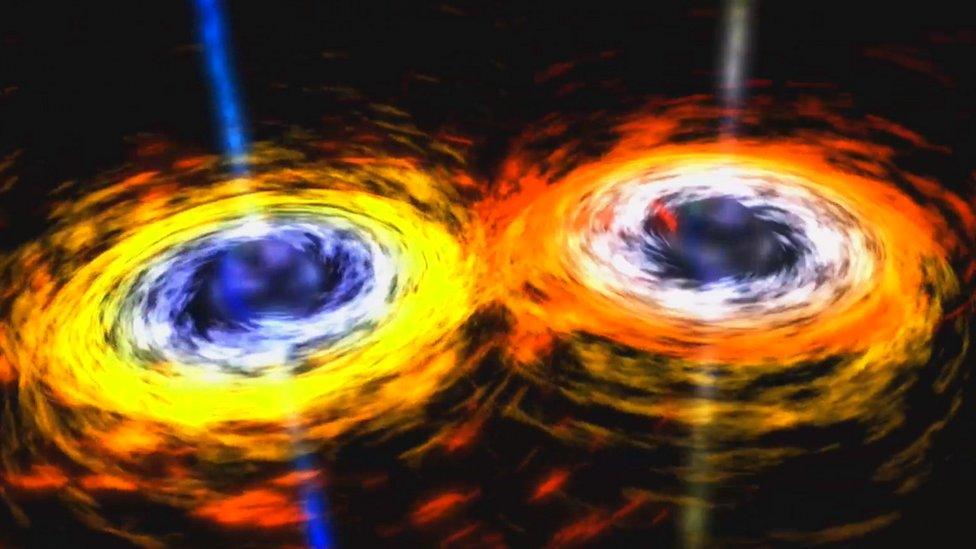Reaction: Gravitational waves discovery
- Published

Scientists detected the ripples in space-time generated by the merger of two black holes
For the first time, scientists have discovered the signature of tiny ripples in space-time, predicted by Albert Einstein 100 years ago.
Here's a selection of the reaction to news of the findings.
Brian Cox, Royal Society professor for public engagement in science, said:
This is a very exciting discovery for two reasons. Firstly, it confirms yet again that Einstein's Theory of General Relativity, published 101 years ago, is a supremely precise description of space-time, gravity and the evolution of the Universe.
This opens up an entirely new way of observing the Universe. We can now observe collisions between black holes, probing gravity in ever more exotic and extreme situations, and look back in time far closer to the Big Bang than ever before. Gravitational wave astronomy opens up an entirely new window on nature.
Prof Kip Thorne, from the California Institute of Technology (Caltech), who originally proposed the LIGO experiment in the 1980s, said:
Until now, we have only seen space-time when it's calm. We have only seen the surface of the ocean on a calm day when it's quite glassy. We have never seen the ocean riled by a violent storm with crashing waves before.
Dr Szabolcs Marka, an astrophysicist at Columbia University in New York, commented:
Until this moment we had our eyes on the sky and we couldn't hear the music... The skies will never be the same.
Prof David Reitze, executive director of the LIGO project, which detected the gravitational waves, said:
This is truly a scientific Moon-shot and we did it. We landed on the Moon.
Up until now we have been deaf to gravitational waves, but today, we are able to hear them.
Prof Abhay Ashtekar, theoretical physicist at Penn State University in Pennsylvania, said:
It's really comparable only to Galileo taking up the telescope and looking at the planets... Our understanding of the heavens changed dramatically.
Prof Alberto Vecchio, from the University of Birmingham, a member of the team, commented:
This observation is truly incredible science and marks three milestones for physics: the direct detection of gravitational waves, the first observation of a binary black hole, and the most convincing evidence to-date that Nature's black holes are the objects predicted by Einstein's theory.
Prof Karsten Danzmann, from the Max Planck Institute for Gravitational Physics and Leibniz University in Hannover, Germany, stated:
There is a Nobel Prize in it - there is no doubt.
It is the first ever direct detection of gravitational waves; it's the first ever direct detection of black holes and it is a confirmation of General Relativity because the property of these black holes agrees exactly with what Einstein predicted almost exactly 100 years ago.